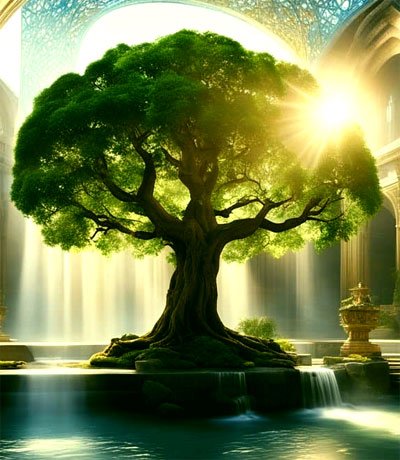
Throughout scripture, gardens hold a significant metaphorical meaning, representing various aspects of the human experience and divine intervention. Three gardens in particular – the Garden of Eden, the Garden of Gethsemane, and the Garden in Revelation – offer profound insights into the redemptive work of Christ and the ultimate fulfillment of God’s plan for humanity.
The Garden of Eden: The Birthplace of Humanity
The Garden of Eden, as described in the Book of Genesis, serves as the backdrop for the creation of humanity and the initial fellowship between God and mankind. Perfect harmony and communion existed between God and His creation before the fall of Adam and Eve.

In this garden, God provided everything necessary for the sustenance and well-being of Adam and Eve. They were given the responsibility to tend and care for the garden and were given full access with one exception: And the Lord God commanded the man, saying, “You may surely eat of every tree of the garden, but of the tree of the knowledge of good and evil you shall not eat, for in the day that you eat of it you shall surely die.” Genesis 2:16-17
The entrance of sin into the world shattered this idyllic paradise. Adam and Eve’s disobedience severed their relationship with God, separating them from Him by their expulsion from the garden and the introduction of suffering, toil, and death into the human experience.
The Garden of Gethsemane: The Place of Surrender
The Garden of Gethsemane, situated near the foot of the Mount of Olives, holds immense significance in the life and mission of Jesus Christ. It was in this garden that Jesus, fully aware of the impending crucifixion and the weight of humanity’s sin, experienced a profound moment of surrender to God’s will.

As Jesus, in His humanity, grappled with the immense burden of the sins of the world, He prayed, “Father, if You are willing, remove this cup from Me. Nevertheless, not My will, but yours, be done.” Luke 22:42. His willingness to submit to God’s plan, even in the face of unimaginable suffering, demonstrated His perfect obedience and love.
Through His atoning sacrifice on the cross, Jesus bridged the chasm between humanity and God, offering redemption and the restoration of the broken relationship caused by sin. The Garden of Gethsemane, therefore, shows us the pivotal moment of surrender in the ultimate fulfillment of God’s redemptive plan.
The Garden in Revelation: The Restoration of Paradise

In the book of Revelation, the final garden is a restored paradise, where the effects of sin and its consequences are completely eradicated. This garden is the culmination of God’s plan for creation, where all things are made new.
Revelation 22:1-2 describes this garden: “Then the angel showed me the river of the water of life, bright as crystal, flowing from the throne of God and of the Lamb through the middle of the street of the city; also, on either side of the river, the tree of life with its twelve kinds of fruit, yielding its fruit each month. The leaves of the tree were for the healing of the nations.” .
Here, the tree of life bears fruit for the healing of the nations. This garden represents the ultimate fulfillment of God’s redemptive work through Christ, where sin, suffering, and death are no more, and eternal fellowship with God is fully restored for those who put their faith in Christ.
Christ’s Role in Bringing the Gardens to Fruition
Christ plays the central role in the significance of these three gardens. In the Garden of Eden, Adam’s disobedience and separation from God found its remedy in the sacrificial, atoning work of Christ on the cross.
In the Garden of Gethsemane, Jesus willingly embraced the cup, enabling the restoration of the broken relationship between God and mankind. His obedience made the way for the ultimate fulfillment of God’s redemptive plan, as depicted in the Garden in Revelation.

Through His life, death, and resurrection, Christ brings all three gardens to fruition. He restores the paradise lost in Eden, offers redemption and reconciliation in Gethsemane, and ushers in the eternal kingdom in Revelation.
As believers, we are invited to participate in this redemptive story. Just as Adam and Eve were called to tend the Garden of Eden, we are called to be stewards of God’s creation and ambassadors of His Kingdom. Only through faith in Christ, can we experience the restoration and fulfillment that these gardens symbolize, both in this present age and in the age to come.
May we embrace the significance of these gardens and live in the hope and assurance of Christ’s transformative work in our lives and in the world.
See this entire podcast HERE.
Come to Christ.

